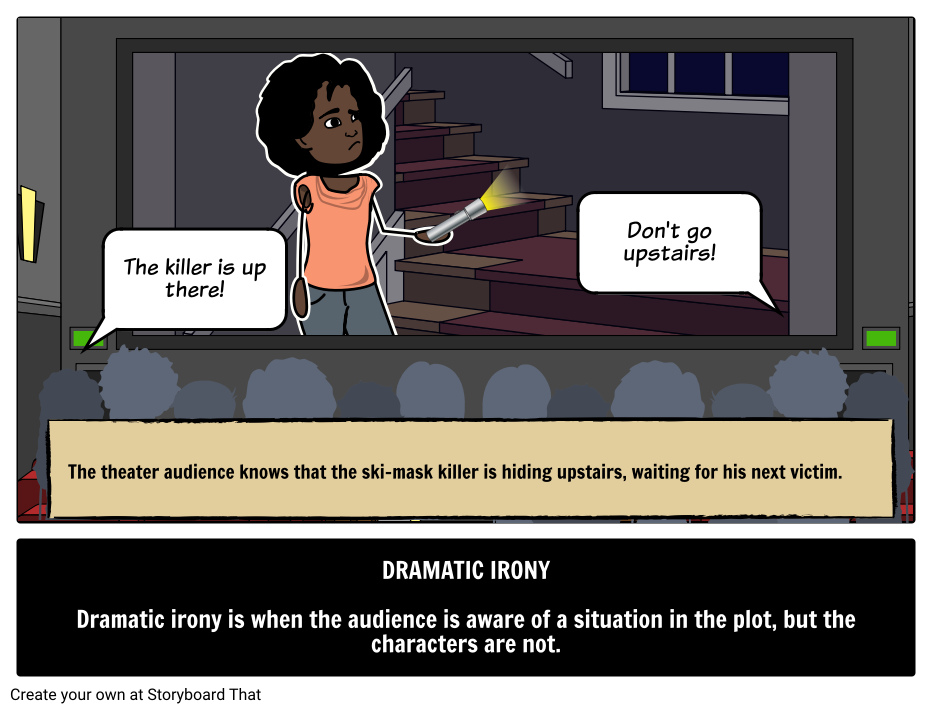Dramatic Irony Definition: when the audience is aware of a situation in the plot, but the characters are not
Dramatic Irony
Dramatic irony is used to enhance hidden meanings in dialogue or actions by characters, since the audience understands there is more going on than the characters themselves do. This knowledge can create an atmosphere of suspense, or even comedy. The characters who are unaware of the underlying truth of a situation will seemingly act inappropriately or even stupidly, because they do not know the true intentions of other characters, or the real events that have occurred in the plot. Their misunderstandings can lead to more conflict and a sense of tragedy for the audience or reader. For example, when Brutus is trying to decide whether or not to join the conspiracy against Caesar in The Tragedy of Julius Caesar, he receives several letters seemingly written by citizens of Rome, begging him to subvert Caesar’s power. This ultimately is what pushes Brutus to finally join the conspiracy, but the audience knows that those letters were written by Cassius, a greedy senator who wants to destroy Caesar and gain some of his power.
Notable Dramatic Irony Examples in Literature
- The real reason behind the witchcraft accusations in The Crucible
- Juliet’s potion that makes her appear dead in Romeo and Juliet
- Oedipus’ true identity in Oedipus Rex
- The true author of the letters in The Tragedy of Julius Caesar
- Montresor’s true intentions for Fortunato in “The Cask of Amontillado”
- Henry had actually run from combat in The Red Badge of Courage
Be sure to check out our article, Three Types of Irony!
How Tos about What is Dramatic Irony?
How to Teach Dramatic Irony Using Picture Books
Choose a picture book that features clear examples of dramatic irony, such as fairy tales or fables where the reader knows more than the characters. Picture books make dramatic irony accessible and engaging for younger students.
Introduce the concept with relatable examples
Explain dramatic irony by sharing simple, familiar scenarios—like a surprise party or a hidden object—that students have likely experienced. Relatable examples help students understand the idea before diving into literature.
Read aloud and pause for discussion
Read the chosen picture book aloud, pausing at key moments to ask students what they know compared to the characters. This encourages active listening and critical thinking about the story.
Guide students to identify dramatic irony
Ask students to point out where they notice dramatic irony in the story. Let them explain how knowing something the characters don’t changes their experience of the plot.
Have students create their own examples
Invite students to draw or write a short scene showing dramatic irony, using familiar situations. This reinforces understanding and encourages creativity.
Frequently Asked Questions about What is Dramatic Irony?
What is dramatic irony?
Dramatic irony is when the audience knows something important that the characters in a story do not. This creates suspense or humor as the audience anticipates what will happen next.
Can you give an example of dramatic irony in literature?
In Romeo and Juliet, the audience knows Juliet is alive, but Romeo believes she is dead. This misunderstanding leads to a tragic ending, making it a classic example of dramatic irony.
How does dramatic irony affect a story?
Dramatic irony builds tension, engages the audience, and can add humor or tragedy. It lets viewers or readers see events unfold with extra knowledge, making the outcome more powerful.
What is the difference between dramatic irony and situational irony?
Dramatic irony happens when the audience knows more than the characters, while situational irony is when the opposite of what is expected actually happens in a situation.
How can teachers explain dramatic irony to students?
Teachers can use simple stories, films, or plays where the audience has information the characters do not. Discussing these examples helps students understand dramatic irony in an engaging way.
© 2026 - Clever Prototypes, LLC - All rights reserved.
StoryboardThat is a trademark of Clever Prototypes, LLC, and Registered in U.S. Patent and Trademark Office


